Between them, Rina Dhaka and Leena Singh (of Ashima-Leena) share 65 years of experience in fashion. And, they have both lent their voices to the RE.purposed initiative that talks about the need for sustainability in current times, a brainchild of NGOs Myna Mahila Foundation and Srujna. We caught up with the two.
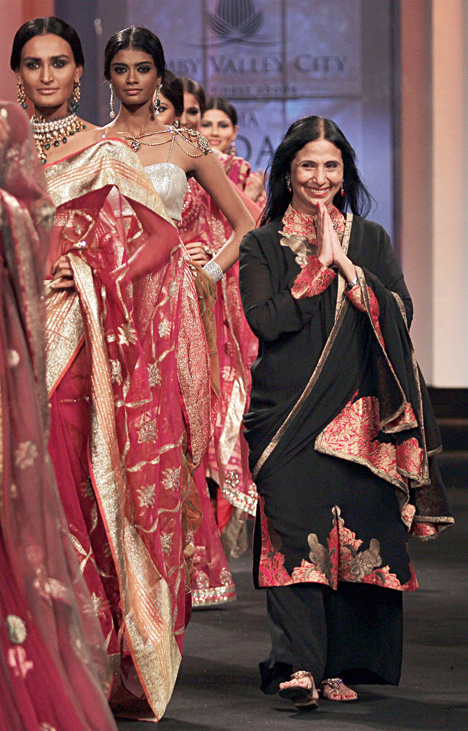
Leena Singh Sourced by The Telegraph
How are you involved in the initiative?
Rina Dhaka: You know, sustainable is a very important way forward for the future or actually current times also. If you go into our traditional systems, we really believed in conserving our tradition. Consumerism was limited and the journey of the thread or the yarn had a lot of effect on saving the wastage of water…. What is happening in our environment is a sum total of what we have been doing. Right now we have put masks on our faces and we don’t have enough knowledge about the disease. We have to take care of ourselves and protect our environment. Any initiative, which supports it with seriousness, I feel privileged to be a part of it.
Leena Singh: I have always done things beyond myself. Ashima-Leena is a brand which has always looked at the unglamorous side of life. It is very important to see the unseen hands of the labourers who have brought us here. They are the real heroes for me. So, in a way, I have been connected with the right cause. Sustainable fashion is something which gives you the opportunity to empower the people who are unseen by the fashion world.
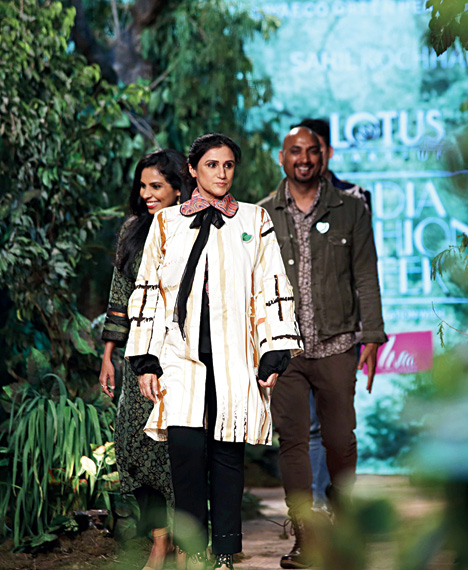
Rina Dhaka. Sourced by The Telegraph
You have literally seen the evolution of Indian fashion. What purpose should fashion be serving right now?
Rina: Currently, fashion has a sense of responsibility towards its own survival. It is one of the industries which is extremely hurting because the patterns have changed and the buying has changed. That whole retail industry has suffered. Fashion needs survival from the sheer point of view of livelihood. The other thing is conscious fashion where you make choices. The pricing needs to be corrected of the sustainable yarn and fabric and more education to drive home to every small retailer and seller wherein he also promotes conscious fashion and its advantages and yet keeps a compatible pricing.
Leena: I think it is time to go beyond yourself. We should try and recycle our old clothes. Take a charity route. I think the western look had overtaken our real heritage Indian craft. It’s time to come to your basics. Why should the sari disappear?
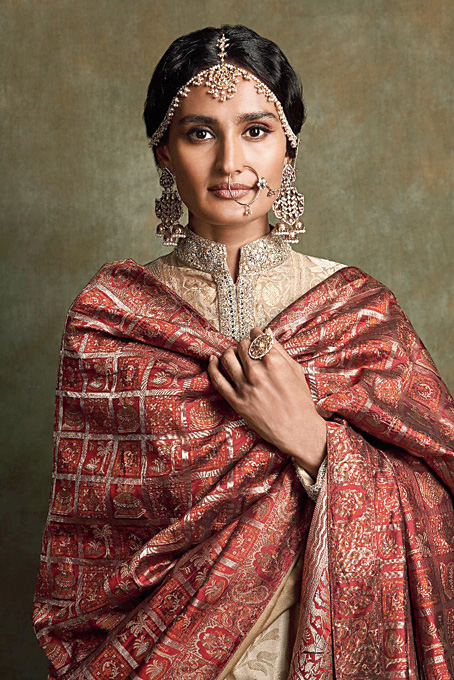
Ashima-Leena’s couture 2020 collection Umme Rabab is a play of “antique textiles sourced from the closet of princesses of the Mughal era... restored and redone”. Sourced by The Telegraph
How did you spend your lockdown and what kind of an impact has it had on your creative process?
Rina: The lockdown has been a great eye-opener for me. It made me realise that I had a holiday. I hadn’t had one for so long. I didn’t have the responsibility of my workforce or selling to my customer. For at least those three months, I had that freedom. It was a great time for me to learn. I realised the importance of social media, which I detested and avoided like plague. You may say I am a stalwart with a 30-year-experience, but in that game I am not even a beginner. I started hanging on to the phone more. I am building my life again in my way. It is a new beginning. I am coming into a world I am not familiar with or chose to avoid.
Leena: My whole attention was to do something for the people. We could still sustain our livelihood despite lockdown but there were so many people who couldn’t eat. I was also preparing for Umme Rabab, our new collection.
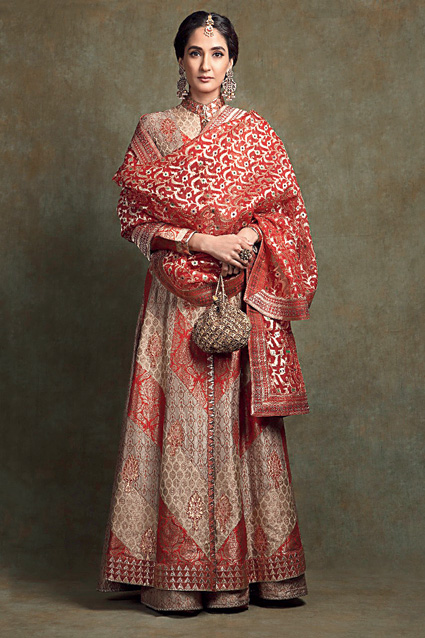
Ashima-Leena’s couture 2020 collection Umme Rabab is a play of “antique textiles sourced from the closet of princesses of the Mughal era... restored and redone”. Sourced by The Telegraph
Are you thinking differently?
Rina: We have downsized to survive but we have ensured that the people who have worked with us are not hurting. The choice was mutual. A lot of our workers have preferred to go back to their lands and be with their families. In this lockdown, I feel our workers and the migrants sort of had a better connect than we who had these pucca houses. I feel when they return to us, the world will also return back. The journey is important in our lives.
Leena: Teaching has been my passion. I was teaching at Pearl Academy for so many years in the ’90s as a guest faculty. I was a lawyer by profession too. I now want to have a design school of Ashima-Leena where I can educate the girls who cannot afford education in other design colleges. I want to give them wings and impart the knowledge of 35 years to someone who can take it forward.
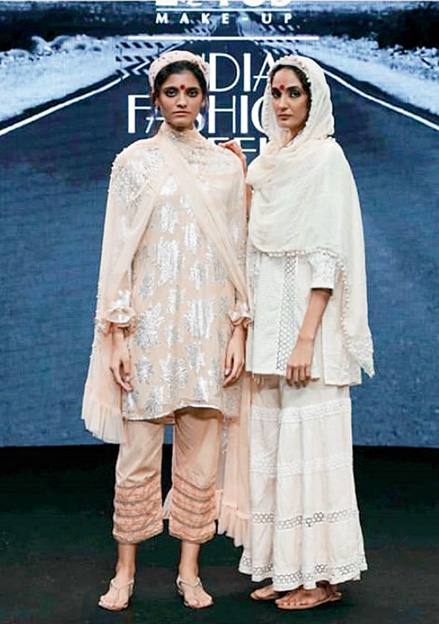
Rina Dhaka’s Spring Summer 2021 collection celebrated those “who are lost in the layers of larger-than-life runways and magnificent brick-and-mortar retail stores”. Sourced by The Telegraph
‘Sustainable’ is a buzzword now. When did you become aware?
Rina: I have been working on and off over the years with NGOs. Khadi itself is a very big thing in India. It is an organic fabric. What are you using today? You are using more plastic and heinous materials than ever before because in half of your mask, the fusing material they are using is poly. You will have a crisis because of this.
The word ‘sustainable’ is ironic, because barring a few techniques, nothing is sustainable in clothes. You have to use a dye which is a chemical. Plant-based dyes are very little and even to hold the glue and keep the colour pucca, you have to put a glue which is again not sustainable. The soil has to be cleared up for eight years before it becomes organic… but yes, there is a sense of curiosity and the journey has started and you feel better when you wear a sustainable fabric and you have a feeling that your spending was justified. The very important thing is it should not be fake sustainable.
Leena: Ashima-Leena is a brand, which has always been connected to the craft, weavers and heritage of the country. For me, sustainable fashion is something where we do not waste anything. In lockdown, I got about 10-20 women and I gave them scraps of cloth and I told them to stitch it together. No thought process was involved ke yeh Chanderi hai or woh brocade hai. We created a magical fabric and then we made a jacket out of it. We also made bedcover and table mats out if it. I got something so novel. This was to empower the women who needed groceries for their families. When I sold it, I put the money in children’s online education. You should also be able to sustain the thought.
I make buttons out of tassels. I source the brocade saris from the closets of the maharanis. Restoration is a part of sustainable fashion for me. I send them to my weavers and they are rewoven and so, I have been able to create something new from the old. There are these women in Delhi who buy old saris and I buy from them. This in turn gives them livelihood and I have something which I wouldn’t get otherwise. Sustainable fashion is something you can use for a longer time. Classic and timeless.
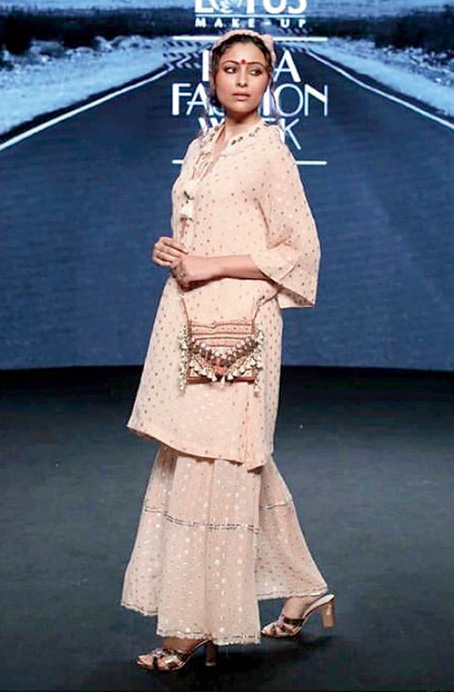
Rina Dhaka’s Spring Summer 2021 collection celebrated those “who are lost in the layers of larger-than-life runways and magnificent brick-and-mortar retail stores”. Sourced by The Telegraph
How do you view luxury now?
Rina: The bottom and top-end is selling. It is the middle which has had a hit. If you see (brands like) Louis Vuitton and Dior have shown profits during the lockdown, while most of us have hurt. I cannot say I haven’t hurt, but I cannot say I died. I have been fortunate that I have been able to get through.
What has helped you course through this?
Rina: You basically learn to restart constantly. I am really a new beginner and have to have that energy and desperation, that hunger when you were 20… you don’t know where you are going but you have a hunger. So, you want that energy back.
What is your top tip for all those aspiring to take up fashion as a career?
Rina: Fashion is a lot of hard work. There is a lot of misconception about it. Behind the scenes you have to learn from the workers or be one of them. You have to get your hands dirty. There is nothing fashionable.











